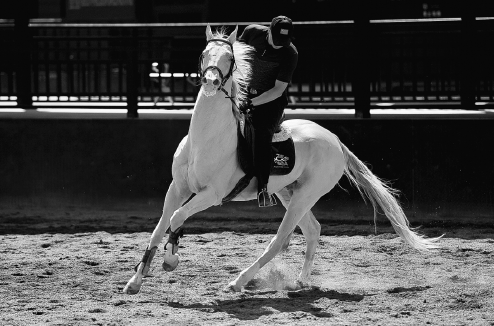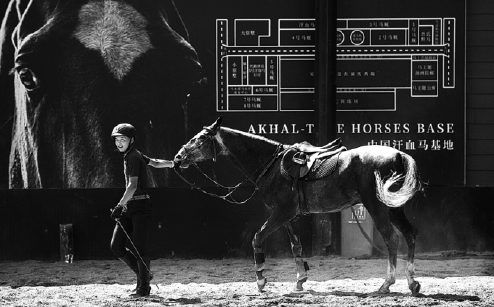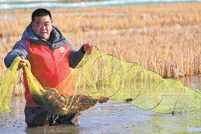RIDING HIGH
Xinjiang horse stable boasting world's top breeds looks to share equine success with neighboring areas to build on Silk Road legacy.

Legend has it that Emperor Wu of the Western Han Dynasty (206 BC-AD 24) sent missions to seek "heavenly horses", with word that the kingdoms of Central Asia boasted invincible war steeds that would boost the might of his imperial armies.
The trailblazing explorations subsequently went beyond their equine ambitions-laying out an unprecedented trading and transportation network that became the historic Silk Road of economic and cultural exchange.
Building on the East-West legacy, a major stable in Northwest China's Xinjiang Uygur autonomous region is set to share its success in preserving and promoting Akhal-Teke horse history and culture with neighbors like Kazakhstan, Turkmenistan and Uzbekistan.
"It's a turnaround of sorts. The horses came from these areas and now we're 'sharing' them back," said Chen Zhifeng, head of the Yema Group behind the Xinjiang Ancient Ecological Park in regional capital Urumqi.
Akhal-Teke horses are Turkmen breeds known for their speed, endurance, intelligence and sleek mien, giving them a regal bearing prized by equestrian riders and collectors since ancient times, when the mounts thrived in the challenging Central Asian climate that formed an indelible part of the Silk Road journey.
The Akhal-Teke is also famous for divinely "sweating blood" as it galloped across the steppe, an appearance attributed to powerful veins showing through its sheen as well as parasites that made it bleed.
The park hosts the largest Akhal-Teke horse base of its kind in the country, containing about one-sixth of the estimated 3,000 specimens worldwide, Chen said, with painting, sculptures and other artifacts and relics complementing the equestrian experience.
The site covering about 13.3 hectares also touts rare, ancient desert poplars (populus euphratica), with 3,800-year-old trees within its forest. Tourism has increased steadily in recent years to hit about 1 million visits annually, he said.
Chen, 58, who has been gathering Akhal-Tekes from neighboring areas in the past two decades, said cultural and equestrian exchange programs and performances involving the horses will continue and ride on latest Belt and Road developments that fittingly leverage Silk Road heritage.
"We've successfully promoted understanding across countries and peoples through equestrian culture," he said. His group, which records an average annual trade volume of $1 billion involving its Central Asian import-export business, is posed to further promote cultural tourism home and abroad via its ecological platform, he said.
Wutzala, head of the China Horse Culture, Sports and Tourism Institute, which is under the Art Development Center of the Ministry of Culture and Tourism, pointed to the rich legacy of the Akhal-Teke, which has been used to build diplomatic and cultural ties up to modern times.
"There is real value in keeping these equestrian traditions alive, with cultural exchange efforts like these well-placed to grow the region's role in the Belt and Road," he said.
Jumabay Turdahun started riding Akhal-Teke horses at the Urumqi park last year, training for equestrian events that have taken him to various parts of the country.
"I've been riding since young, horses are a major part of our life and culture," said Jumabay Turdahun, 23, who is a member of the Kirgiz ethnic group. He has also been sharing his riding and horse-handling moments on short-video app Douyin, drawing more than 200,000 fans.
"It is a great honor and privilege to ride and be among these Akhal-Teke horses. I hope more people are able to learn about them and bring us closer together," he said.
Beijing retiree Feng Ruiming, 66, was among the summer crowds at the ecological park with his wife.
"I used to ride horses myself and it's amazing to be able to see these famous breeds here. They are very amicable and you can feel how close they are to us."



Today's Top News
- Drills demonstrate China's resolve to defend sovereignty against external interference
- Trump says 'a lot closer' to Ukraine peace deal following talks with Zelensky
- China pilots L3 vehicles on roads
- PLA conducts 'Justice Mission 2025' drills around Taiwan
- Partnership becomes pressure for Europe
- China bids to cement Cambodian-Thai truce






























